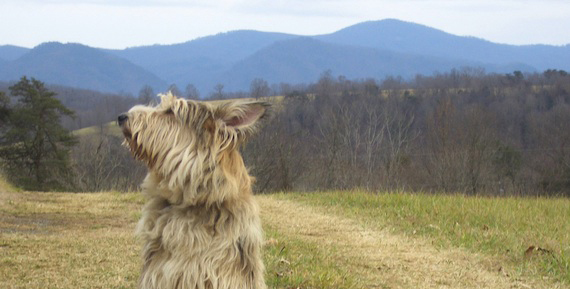Early on in my days as Moune’s human, I took her to obedience classes at the local ag school. It so happens that St. Gervais d’Auvergne, a town a few miles from my own in central France, is home to one of the country’s few lycées agricoles dedicated to teaching kids how to raise, train, and care for dogs, cats, and smaller pets. You can take lessons there for five euros a pop with a senior student, overseen by a roving teacher.
The roving teacher watched us go through the basics. My dog’s previous human had put Moune through her paces, and she was on her best behavior in the dog school setting.
“Really, she is already a great dog. But I understand she’s recently adopted, so it is good for the bonding,” said Madame Lagrange. “One thing I would encourage for you to remember: she is a dog, not a person.”
Ha. I knew that, right? I’d seen plenty of canines that seemed to be their humans’ surrogate children, and that wasn’t going to happen here. So when I found myself speaking to her in “wuzza wuzza Ma MouMoune” baby talk, I was aghast. I nipped that one in the bud, but the closer I looked, the more I realized how difficult it is for me to abstain from projecting my human motives, foibles, and even goodness onto my dog, who likely has her own motives, foibles, and guileless goodness. In fact, for me and for most of us, it takes a conscious effort to recognize the extent to which we project our motives, foibles, and qualities onto our fellow humans, much less our pets.
One of my neighbors in retreat in the nineties was Dodé, an angular, enterprising German woman who didn’t need much sleep. She effortlessly and religiously followed the retreat schedule (this, in itself, was annoying enough) and used the evening post-practice hours after 10 p.m. to drill, hammer, fit shelves, and engage in other like projects. We shared a wall, so her forays into home improvement deprived me of precious sleep. She had to know she was bugging me, I thought, as resentment built. I certainly would. But when I finally confronted her, her eyes widened in shock and she hugged me and apologized profusely. The aggravation hadn’t even occurred to her. Instantly, I loved her and we’ve remained friends and pen pals (she’s still in retreat) ever since.
I recall this situation with Dodé because it taught me something about myself, my assumptions, and what they might mean. If I were doing this thing, this is what it would signify. From my experiential basis as a reasonably sane and intelligent middle-aged Franco-American woman, I add my other variables and voilà: I’ll automatically interpret Dodé, Moune, and the rest of the sentient world within the scope of what I am capable of imagining.
Our perceptions and the conclusions we draw from them determine our experience of this life. The ways that different life forms relate to water is the classic example that reminds us of the subjectivity of this experience: can we truly maintain that there is some objective validity to how we humans perceive water as opposed to the perceptions of otters, fish, tadpoles, dragonflies, octopi, or pelicans (not to mention the panoply of imperceptible beings in the Buddhist canon)? As long as we’re aware of the anthropocentric nature of our perceptions and conclusions and of the limits of our projections, there’s plenty of room for communion.
When we were kids, we’d play at trying to picture the thing that was farthest from our minds. I do my best to understand Ma Moune in all her wonderful Moune-ness, but there will always be a part of human me in that—and a part of canine her—that is farthest from my mind. For her part, she does her best to read me based on my tone of voice, smiles, and frowns. She recognizes the sound of her name and commands, which she may or may not choose to heed, even if words in general do resonate like “wuzza wuzza” to her ears. Maybe my inability to make sense of subtle odors baffles her as well.
In fact, her instincts and motives do resemble my own in that their motor is hope and fear. My best guess is that her hopes include treats, a warm bed, squirrels, walks, and companionship; and her fears center around abandonment, storms, and threats to her human. Take away the squirrels and there’s a fair amount of overlap. Right now she is antsy: she sees me packing, loading a van. She senses that change is afoot, but doesn’t know how it will impact her. She’s clearly in her element in the quiet retreat cabin we’ve been sharing in Natural Bridge, Virginia, for the past few weeks. “Ah no, not again,” I hear her think. “You’re not taking me away from this Shenandoah Valley paradise, its tantalizing deer and burbling streams and crunchy leaves to frolic in. We’ve been taking the most fabulous walks! This is the perfect home for us.”
Yes, Ma MouMoune, we’re leaving Natural Bridge and moving north. I’m antsy too: new home, new job. I don’t know what you’re thinking, but I feel what you’re feeling. No fears: I’ve got your shaggy back, now and always.
♦
Dharma teacher and Tricycle contributing editor Pamela Gayle White has been writing about life with her dog, Moune, for the last three months on Tricycle’s blog. You can read her earlier posts, “Ma Moune” and “A Special Bond.”
Thank you for subscribing to Tricycle! As a nonprofit, we depend on readers like you to keep Buddhist teachings and practices widely available.
